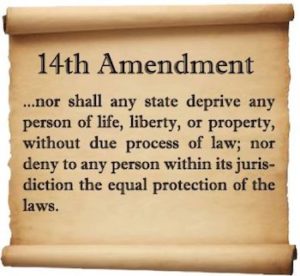
*On this date in 1868, the Fourteenth Amendment to the United States Constitution was adopted.
Approved as one of the Reconstruction Amendments, it is one of the most essential American amendments to the present day. The amendment addresses citizenship rights and equal protection under the law and was proposed in response to issues related to former slaves following the American Civil War.
The amendment was bitterly contested, particularly by the slave states of the defeated Confederacy, which were forced to ratify it to regain representation in Congress. The amendment, particularly its first section, is one of the most litigated parts of the Constitution, forming the basis for landmark decisions such as Brown v. Board of Education (1954) regarding racial segregation, Roe v. Wade (1973) regarding abortion, Bush v. Gore (2000) regarding the 2000 presidential election, and Obergefell v. Hodges (2015) regarding same-sex marriage. The amendment limits the actions of all state and local officials, including those acting on their behalf. The amendment also shows the intersectionality between race, gender, and gender identity in America. It became law on July 28, 1868.
Also, in 2022, a group of Georgia voters hoped section 3 of the amendment could knock U.S. Rep. Marjorie Taylor Greene off the ballot. They claim that the congresswoman helped facilitate the Jan. 6 Capitol riot, which stemmed from efforts to stop the certification of Joe Biden's presidential election win in 2020.